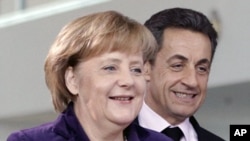French and German leaders say growing the economy and creating jobs should be Europe's top priorities for 2012. French President Nicolas Sarkozy and German Chancellor Angela Merkel also defended a controversial proposal to tax financial transactions during a meeting Monday in Berlin.
French and German leaders maintained a solid front on proposals that included more fiscal discipline but also efforts to inject life into the sluggish European economy, create jobs and make Europe more competitive.
In broadcast remarks from a press conference in Berlin, German Chancellor Angela Merkel said France and Germany are determined to solidify the finances of the 17-member eurozone while also relaunching growth. Their aim is not just to stabilize the euro, she said, but to create a strong, modern and competitive Europe.
Merkel and French President Nicolas Sarkozy also called for injecting more capital into a European bailout fund, for Greece to honor its reform promises and for European leaders to act more swiftly in finding solutions to the debt and banking crisis.
Overseeing Europe's two largest economies, Merkel and Sarkozy have been the driving force in pushing through a new fiscal compact endorsed by most European Union countries in December. Britain is the only country that clearly bowed out of the deal.
The French and German leaders said they hoped the details of the pact will be in place this month and that it will be signed by March 1.
Analyst Laurent Maruani, of the HEC business school in Paris, said the two heads of state are determined to present a unified front.
"Now that they have been pulling and pushing Europe in all directions, they cannot step back. Stepping back would be a disaster for them," said Maruani.
Merkel and Sarkozy also endorsed a controversial idea to tax financial transactions that Sarkozy has vowed to push through alone if he does not get support from other EU members.
The French president said those financial players responsible for getting the eurozone into its current crisis also should pay for getting it out. If France does not push through the tax, he said, the idea may never be realized.
Europe's sovereign debt and banking crisis dominated the EU agenda for much of 2011, and it is unlikely to disappear anytime soon. France and Germany both face threats of a possible downgrade of their debt rating, following similar downgrades of more ailing economies like Spain and Italy.
On Monday, investors bought German short-term debt at negative interest rates for the first time. The euro also has dipped to its lowest value in months compared to the U.S. dollar - another sign of ongoing jitters in the financial markets.
France, Germany Call for Boost in European Jobs, Economy
- By Lisa Bryant




